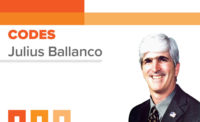By the time you read this column, the public comment period for the International Code Council Group A code changes will have come and gone. That shows the speed this process follows in developing the 2018 ICC codes.
The remaining issues I have not addressed in previous columns are the proposed changes to the Fuel Gas Code – the first major code to start the ICC hearings – and the Mechanical Code.
The change process for the the Fuel Gas Code always is interesting to watch. Because of an agreement between the American Gas Association and ICC, the Fuel Gas Code committee always must have six representatives from the gas industry appointed by AGA. Only six additional members are permitted on the committee and the AGA representatives can never serve as chairman of the committee (only vice chairman).
Please understand ICC rules prohibit the chair from voting unless a tie needs to be broken. Well, when there only are 12 members on the committee, including the chair, it means there will never be a tie vote and the chair simply will be a figurehead running the committee and asking for votes. The chair has no say on the Fuel Gas Committee.
If you did the math, that means AGA controls the committee. Anybody who has attended the hearings has observed that AGA representatives vote in lockstep. They might as well just ask the AGA staff person on the committee what the outcome of each code change will be.
That is not to say all the AGA votes are bad. Most are very good votes. But, then when you see the votes go 6-5, 6-5 and 6-5, you know code officials are getting mad. Many of the 6-5 votes received a floor motion that allowed the membership to overturn the committee decision. Every floor motion to the Fuel Gas Code was successful in being overturned by the ICC membership.
That is unprecedented. None of the codes had a 100% success rate in overturning committee recommendations. This also is a message to ICC and AGA: something is broken.
Going underground
One of the hot issues on gas piping was the penetration of a gas pipe through the foundation wall. A proposed change by AGA would allow gas piping to penetrate the foundation wall underground. Currently, the gas pipe must come from aboveground to penetrate the foundation wall. The proposal would require the undground pipe to be sleeved. The committee voted to recommend approval of this change. However, this is a change that was overturned by the membership with a recommendation for denial.
Tracer wire was another underground pipe issue that was brought up. The current code requires a yellow insulated copper wire when nonmetallic gas pipe is installed. The change will allow other products specifically designed for that purpose. This is an approach engineers have used as an alternative for approval for many years. With a recommendation to have this change approved, it will be allowed without special designation.
One of the changes on manifold shutoff valves would require the manifold to be on the same floor level as the appliance. The committee opposed this measure. However, this change was overturned by the membership vote.
Mechanical Code changes
The majority of the Mechanical Code changes related to duct and exhaust systems. One of the changes on water systems would require all systems to comply with the new ASHRAE 188 standard on Legionella risk management. Many thought there was be a lot of back and forth on this code change. However, the change was quickly rejected since the ASHRAE standard has not yet been published. All the discussions will have to wait for a later date.
Every cycle on the Mechanical Code you can expect a couple hours of discussion on plenums. The constant hot topic is what can be exposed in a plenum. If you ever sat through the hearings, you would be convinced a plenum is one of the deadliest places in a building. However, it is amazing that the fire statistics prove otherwise.
But that never seems to matter.
This cycle, the code change proposed to expand the allowance of plastic pipe in plenums. That would include plumbing piping, chilled water, hot water and sprinkler pipe. Pipe listed to the UL standard for plenum exposure would be allowed to be exposed in a plenum. The code changes were approved after all the proponents met and came to an agreement on the new requirements. Any pipe insulation will have to meet the 25 flame-spread and 50 smoke-developed rating requirement.
A proposal to ground-source heat pumps would have required all systems to comply with ANSI/CSA C448. If you have ever done a ground-source heat pump system, you quickky would realize this standard does not address every type of system. As a result, the committee recommended denial of the change.
There always are humorous times at code hearings. When the representative from Big Ass Fans introduced himself, it got some chuckles. Of course, he was speaking about a code change on big-ass fans. His code change was recommended for approval.
There were changes proposed to the solar requirements in both the Mechanical Code and the Residential Code Mechanical sections. The Mechanical Committee modified the solar water heater requirements to be consistent with the Plumbing Code. However, under the Residential Code, the committee approved the change without any modification to the heat exchanger requirements.
If the change is approved, there will be a conflict between the mechanical section and the plumbing section of the Residential Code regarding heat exchangers. One requires fluid to be food-grade while the other states essentially nontoxic. That will impact some fluids. This is an area that needs correcting during the public comment period. The type of heat exchanger would remain a single wall if food-grade, or essentially nontoxic fluid is used.
In August, ICC will publish the public comments to the code changes on www.cdpACCESS.com. Any code change which does not receive a public comment will be automatically approved based on the standing recommendation at the annual conference. All the changes with public comments will be subject to debate at the ICC Annual Conference Sept. 27-Oct. 6 in Long Beach, Calif.
The experiment with online voting will be put to the test following the conference. The ICC voting members (inspectors) will be able to vote online for each of the code changes having public comments.
The final outcome will not be known until sometime in November.
This article was originally titled “In control” in the July 2015 print edition of PME.



